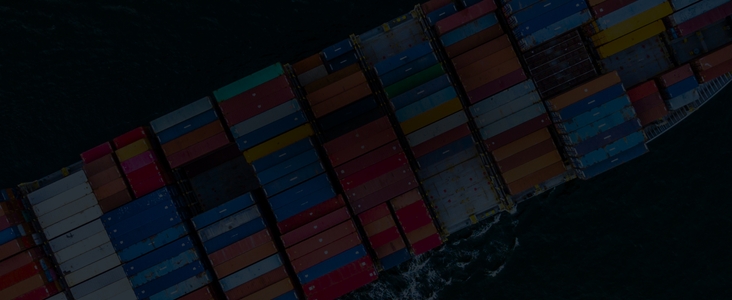
Ocean and Air Shipping from Germany to Singapore
FCL, LCL and Air shipping comprehensive guide and instant online quote
Trade between Germany and Singapore totaled $15.8 billion in 2018, making Singapore Germany’s biggest trading partner in South East Asia.
Businesses shipping commodities between the two nations are likely to find the information and guidance on this page useful. There are details about air and ocean freight, shipping costs and durations, and airports and seaports in both countries.
Know Your Options for Shipping Freight From Germany to Singapore

The two most logical ways for your business to ship freight from Germany to Singapore are by air or sea. Each mode of transportation has pros and cons, so let’s take a closer look at both.
Ocean Freight From Germany to Singapore
Less than Container Load (LCL): If you don’t need all of the space in a container to ship your cargo from Germany to Singapore, you can use LCL shipping. In this case, your freight will share a container with that of other shippers. Many businesses find LCL offers them the most economical shipping option for small quantities of goods.
Full Container Load (FCL): FCL shipping entails paying for the use and shipment of an entire container for your goods alone. It can work out quicker and, for large shipments, far less expensive than LCL.
Air Freight from Germany to Singapore
If you have commercial goods for urgent export from Germany to Singapore, air freight has to be your first choice. Bear in mind, though, that it is significantly more expensive than ocean shipping.
How Much Does it Cost to Ship Cargo From Germany to Singapore?
Several factors come into play when calculating the cost of importing from Germany to Singapore. These include:
- The nature of the freight that needs to be shipped
- The choice made between FCL, LCL, and air freight shipping options
- How big and heavy the shipment is
- How far the goods need to be shipped
- Whether a port-to-door, door-to-door, door-to-port or port-to-port delivery service is required
If you are unsure whether air or ocean shipping is best for your consignment, there’s no harm in asking a freight forwarder to supply both. Generally speaking, if your goods weigh over 100 kg, sea freight will often be more affordable than air cargo. For lighter loads (between 35 kg and 100 kg) your quotes are likely to be similar for both ocean and air shipping. For even lighter loads (under 35kg) you’ll need to approach international couriers for a quote. Freight forwarders do not handle consignments in this weight bracket.
How Long Does it Take to Ship Cargo From Germany to Singapore?

A vessel shipping your container from Germany to Singapore will travel over 17,800 km to reach its destination. It takes at least 30 days. Aircraft take a more direct route of just over 10,000 km. Moreover, the faster average speed of aircraft (900 km/h compared to a cargo vessel’s 35 km/h) means shipping air freight from Germany to Singapore is significantly faster. Shipments take between one and eight days. That’s including all the customs checks and shipping procedures that must be adhered to.
How Long Does It Take to Ship Cargo by Sea From Germany to Singapore?
To give you a couple of examples of transit times for ocean freight on this tradelane, one of the LCL services we use from Bremerhaven to Singapore takes 33 days. Meanwhile, we also offer an FCL service from Hamburg, which takes 30 days.
How Long Does It Take to Ship Cargo by Air From Germany to Singapore?
Air freight shipping durations to Singapore, from Germany’s major international airports are as follows:
- From Dusseldorf, Munich, or Frankfurt – 5 days
- From Hamburg – 4 days
- From Leipzig – 8 days
- From Berlin – 2 days
Customs Clearance in Germany and Singapore
You cannot avoid customs formalities when you import from Germany to Singapore, but you can avoid the hassles associated with customs procedures by hiring a freight forwarder. Doing so minimizes the chances of incorrect documentation delaying your shipment.
Your forwarder will ensure your goods for import from Germany to Singapore comply with regulations in both territories. They will also ask for you to supply the following paperwork:
-
Commercial Invoice
-
Packing List
-
Certificate of Origin
-
Letter of Credit or other payment terms (depends on the contract between the parties involved)
-
Bill of Lading for ocean freight or Airway Bill for air freight (Shipa Freight will provide this for you)
You may also be asked for a certificate, permit, or license. To see examples of the documents featured in the list above, please visit our documents list page.
Should You Choose Ocean Freight or Air Freight?
Ocean Freight
When you choose for your goods to be transported in a shipping container from Germany to Singapore on a cargo vessel, your choice of ports is limited. Germany’s coastline is exclusively in its northern region. Most freight forwarders will recommend either Hamburg or Bremerhaven as the best port of origin for your sea freight. They will route all shipments to the Port of Singapore.
Despite the limited ports, plenty of carriers are available to convey your goods in a container from Germany to Singapore aboard a cargo vessel. Most consignments safely ship in a 20 ft or 40 ft container. The smaller of the two has room for 10 to 11 standard pallets. 40 ft containers can fit up to 21 such pallets.
As well as a choice of container size, ocean shipping offers two options to decide between—LCL and FCL. Let’s look at both:
Learn more about Ocean Freight on our dedicated page by clicking here.
Considerations for LCL Freight Shipping
Less-than-container-load shipping means your goods share a container. It is likely to be best for you if:
- The consignment you are shipping is small—no more than six pallets
- Your consignee doesn’t need the goods in a hurry
- Your goods can be safely shipped in a shared container
- Choosing the right container size is not something you want to do
- Air shipping isn’t viable
It’s worth noting that all LCL freight has to be consolidated at the port in Germany and deconsolidated in Singapore. These additional logistics steps often mean LCL takes longer than FCL shipping.
LCL might not be your best shipping option if:
- Your goods are high-value, fragile or perishable
- Regular moving or handling of your goods could damage them
- You don’t have a flexible delivery date and therefore, cannot entertain shipping delays
- Your goods aren’t suited to sharing a container
Learn more about Less than Container Load on our dedicated page on LCL shipping.
Considerations for FCL Freight Shipping
- Full-container-load ocean shipping gives you exclusive use of a shipping container for your freight. It’s a good option if:
- Your goods are required in Singapore by a specified date
- Your consignment is large enough to warrant paying for the exclusive use of a shipping container
- Your goods are too delicate or heavy to safely share a shipping container with other goods
- You need to seal your freight in a container in Germany and want it to remain sealed until reaching your recipient
Learn more about Full Container Load on our dedicated page on FCL shipping.
Air Freight
Choose air shipping from Germany to Singapore if:
- Your goods are fragile or perishable and need to be transported quickly
- You have an urgent delivery deadline
- Your goods can be safely shipped in the hold of an aircraft
- You want to pay a lower insurance premium than you would if you used an ocean carrier.
- Your cargo requires the stringent security measures taken by airlines and airport operators
- Both your supplier and recipient are based nearer to international airports than seaports (thus saving on overland transit costs)
Learn more about Air Freight on our dedicated page by clicking here.
Ocean Cargo Port Guide
Cargo Ports of Origin in Germany
Bremerhaven
Port Facts:
- Located at the mouth of the River Weser
- One of the biggest container terminals in the world
- The quayside is over five kilometers long
- Can handle 250,000 tonnes of temperature-controlled cargo every year
Owned By: Free Hanseatic City of Bremen.
Annual Container Volume: >5 million TEUs.
UN/LOCODE: DEBRV.
Hamburg
Port Facts:
- Germany’s largest seaport
- Capacity to handle 12 million TEUs annually
- Europe’s third-busiest port
- All four container terminals have integrated rail terminals
Owned By: Hamburg Port Authority.
Annual Container Volume: >8.5 million TEUs.
UN/LOCODE: DEHAM.
Cargo Port of Arrival in Singapore
Singapore
Port Facts:
- Located on the Malay Peninsula
- About one-fifth of the world’s shipping containers are shipped to or from Singapore
- More than 130,00 ocean cargo vessels call at the port each year
- A huge container terminal with the capacity to process 65 million TEUs is being built
Owned By: The Maritime and Port Authority of Singapore.
Annual Container Volume: >37.2 million TEUs.
UN/LOCODE: SGSIN.
Flying Your Freight: Airport Guide
Airports of Origin in Germany
Frankfurt
Airport Facts:
- Europe’s busiest air cargo hub
- Ranked the 13th-busiest airport in the world
- Infrastructure includes Europe’s largest perishables center
- Offers secure storage facilities for dangerous and valuable freight
Singapore Airports Served: Singapore.
Frankfurt to Singapore Cargo-Only Operators: None.
IATA Code: FRA.
Dusseldorf
Airport Facts:
- Located seven kilometers north of Downtown Dusseldorf
- Germany’s third-largest airport
- Largest air facility in the Rhine-Ruhr region in Western Germany
- Offers easy access for any supplier or manufacturer based in Essen or Dusseldorf
Singapore Airports Served: Singapore.
Dusseldorf to Singapore Cargo-Only Operators: None.
IATA Code: DUS.
Munich
Airport Facts:
- Southern Germany’s biggest air cargo hub
- Over 33% of Germany’s air freight is handled here
- Ideal port of origin for suppliers and manufacturers in Bavaria
- Processes over 400,000 tonnes of air freight annually
Singapore Airports Served: Singapore.
Munich to Singapore Cargo-Only Operators: None.
IATA Code: MUC.
Hamburg
Airport Facts:
- A state-of-the-art cargo hub opened in 2016
- Can process 150,000 tonnes of air cargo every year
- Ideal if your supply chain moves goods from Germany’s second-biggest city
- An underpass links the cargo facility directly to the airport’s apron
Singapore Airports Served: None.
Hamburg to Singapore Cargo-Only Operators: None.
IATA Code: HAM.
Berlin-Tegel
Airport Facts:
- Situated just over eight kilometers northwest of central Berlin
- Officially called Berlin Tegel Otto Lilienthal Airport
- Over 90,000 tonnes of air freight was shipped to or from Berlin in 2019
Singapore Airports Served: Singapore.
Berlin to Singapore Cargo-Only Operators: None.
IATA Code: TXL.
Shipa Freight can also coordinate the transportation of goods to Singapore from international airports in Stuttgart, Nuremberg, and Leipzig.
Airport of Arrival in Singapore
Singapore
Airport Facts:
- Sometimes called Changi Airport
- Situated 20km from Marina Bay
- Over two million tonnes of air freight was processed here in 2016
- Electronic components account for a significant percentage of cargo handled here
- Rated the world’s best global air freight hub for value, performance, and facilities
Connected Airports in Germany: Frankfurt, Munich, Berlin, Dusseldorf.
Germany to Singapore Cargo-Only Operators: None.
IATA CODE: SIN.
Why Ship From Germany to Singapore With Shipa Freight?
Shipa Freight is home to an advanced online portal that’s making shipping commodities from Germany to Singapore easier than ever. We’re connecting all kinds of businesses with the top air freight operators and sea freight carriers. Our digital platform is designed to simplify supply chains and allow companies to manage all their international shipping in one place.
Additional benefits Shipa Freight brings to international shipping include:
- Friendly 24/7 customer support service via phone, online chat, or email
- Easy registration for new customers
- Fast quotes and simple bookings
- Assistance to identify and complete the shipping documents your consignment needs
- Management of customs complexities


